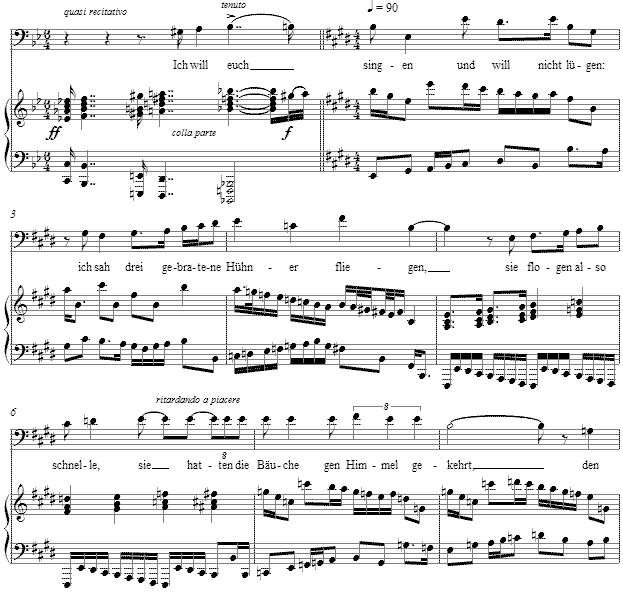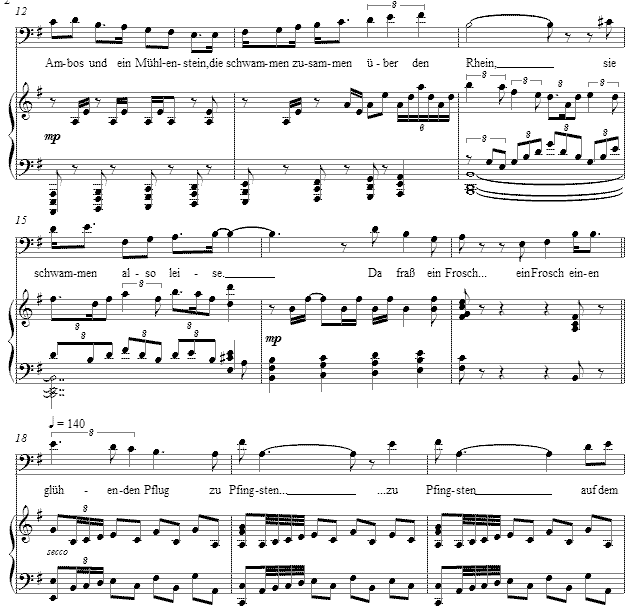Music and Texts of GARY BACHLUND
Vocal Music | Piano | Organ | Chamber Music | Orchestral | Articles and Commentary | Poems and Stories | Miscellany | FAQs
Lügenmärchen - (2001)
Deutsches Kinderlied und Kinderspiel (Böhme)
for baritone and piano or orchestra [ 1 ]
for Manfred Volz, baritone
Ich will euch singen und will nicht lügen:
Ich sah drei gebratene Hühner fliegen,
Sie flogen also schnelle,
Sie hatten die Bäuche gen Himmel gekehrt,
Den Rücken nach der Hölle.
Ein Ambos und ein Mühlenstein,
Die schwammen zusammen über den Rhein,
Sie schwammen also leise.
Da fraß ein Frosch einen glühenden Pflug
Zu Pfingsten auf dem Eise.
Es wollten drei Kerls einen Hasen fangen,
Sie kamen auf Krücken und Stelzen gegangen;
Der Eine konnt' nicht hören,
Der Andre was blind, der Dritte stumm,
Der Vierte konnt' sich nicht rühren.
Nun will ich euch singen, wie es geschah:
Der Blinde zuerst den Hasen sah
Im Feld geschwind hertraben.
Der Stumme rief dem Lahmen zu,
Da faßt ihn der beim Kragen.
Es segelten etliche über Land,
Die Segel hatten sie in den Wind gespannt,
Und segelten auf den Feldern.
Sie segelten auf einen hohen Berg:
Da ertranken sie all' in dem Wäldern.
Es ging ein Krebs auf die Hasenjagd:
Die Wahrheit kommt heraus mit Macht
Und bleibt nicht lang' verschwiegen.
Es lag eine Kuhhaut auf dem Dach,
Die war da hinaufgestiegen.
Hiemit will ich mein Lied beschließen,
Sollt' es die Leute gleich verdrießen,
Und will nicht länger lügen,
In meinem Land sind die Fliegen so groß
Als hier zu Land die Ziegen.(in Deutsche Unsinnspoesie: 1978 Phillip Reclam jun. GmbH & Co., Stuttgart)
Piano-vocal score [ 6 pages, circa 3' 15" ]
A Liar's Tale
I will sing to you and will not dissemble:
I saw three roasted chickens fly,
they flew so quickly,
they had their bellies turned towards the heavens,
their backs towards hell.
An anvil and a mill stone,
they swam together over the Rhine,
swimming so easily.
Then a frog gobbled up a red-hot plough
on Whitsunday on the ice.
There were three chaps who caught a hare,
that came by on crutches and stilts;
The first couldn't hear,
the other was blind, the third mute,
and the fourth couldn't move.
Now I will sing to you, what was seen:
The blind one first saw the hare
trotting quickly in the fields.
The mute one called to the cripple,
to grasp it by the collar.
Sailing several times over the land,
the sail had become taut in the wind,
and sailed over the fields.
They sailed up into a high mountain:
There it drowned its sorrows in the forests.
A crab went along on the rabbit hunt:
truth came along with strength
and didn't stay silent long.
A cow skin lay on the roof,
up to where it had climbed.
Herewith [ 2 ] I will close off my song,
so that it will no longer irritate folks,
and not further lie...
in my country the flies are as big as
the goats here in this land.
To capture the marvelous nonsense of the text, I chose to make a rondo form parody employing many of Richard Wagner's themes from the Ring cycle, Tristan und Isolde, Tannhäuser and other operas which I shall leave it to interested parties to identify.
Among the themes happily quoted are those to underscore the poem's mention of the Rhine river, from Das Rheingold, and the "forging" theme from Siegfried to accompany the "red-hot plough" of the text, for to make so much metal red-hot would of course require a forge.
Below is the conflation of the pilgrim's theme from Tannhäuser with the love theme from Tristan und Isolde, one of the musical jokes in the piece.
This is one of a number of version of a "Liar's Tale" which one might find, and by its approximate date, circa 1800 or before, precedes the often-quoted Das Lügenmärchen [ 3 ] of Ernst Moritz Arndt (1769-1860).
Manfred Volz
The setting is dedicated to Manfred Volz, who played a very sympathetic and beautifully sung Kurvenal in our Tristan und Isolde in Braunschweig, and proved a fine colleague overall. I think fondly of our collaboration together onstage as singers and actors. I worked with him again in Kassel performing the original version of Mussorgsky's Boris Godunov, and heard him sing a fine Scarpia there, which explains the opening chordal gesture.
The score for Lügenmärchen in the baritone key is available as a free PDF download, though any major commercial performance or recording of the work is prohibited without prior arrangement with the composer. Click on the graphic below for this piano-vocal score.
piano-vocal
NOTES
[ 1 ] The orchestra consists of: flute, oboe, B-flat clarinet I & II, bassoon, horn in F I & II, trumpet in B flat I & II, trombone, percussion, piano and contrabass. Full score of 16 pages.
[ 2 ] "Hiemit" is the antiquated form of "hiermit," meaning "with this." "Herewith" is then one of many examples in which modern English and German show the flux between them, as languages change and adapt.
[ 3 ] Arndt was born in1769 in Groß-Schoritz, and became a beloved German patriotic author and poet. Early in his life, he fought for the abolition of serfdom, later against Napoleonic dominance over Germany, and had to flee to Sweden for some time due to his anti-French positions. He is one of the main founders of German nationalism and the movement for German unification. After the Carlsbad Decrees, the forces of the restoration counted him as a demagogue and he was only rehabilitated in 1840. Arndt died in 1860 in Bonn. His version of the Liar's Tale is as follows, to note the similarities. It seems as if his is an adaptation and lengthening of an earlier and anonymous work:
Lügenmärchen
Ich will euch erzählen und will auch nicht lügen:
ich sah zwei gebratene Ochsen fliegen,
sie flogen gar ferne -
sie hatten den Rücken gen Himmel gekehrt,
die Füße wohl gegen die Sterne.
Ein Amboss und ein Mühlstein
die schwammen bei Köln wohl über den Rhein,
sie schwammen gar leise -
ein Frosch verschlang alle beid'
zu Pfingsten wohl auf dem Eise.
Es wollten vier einen Hasen fangen,
sie kamen auf Stelzen und Krücken gegangen,
der erste konnte nicht sehen,
der zweite war stumm, der dritte war taub,
der vierte konnte nicht gehen.
Nun denke sich einer, wie dieses geschah:
Als nun der Blinde den Hasen sah
auf grüner Wiese grasen,
da rief's der Stumme dem Tauben zu,
und der Lahme erhaschte den Hasen.
Es fuhr ein Schiff auf trockenem Land
es hatte die Segel gen Wind gespann
und segelt' im vollen Laufen -
da steiß es an einen hohen Berg,
da tät das Schiff ersaufen.
In Straßburg stand ein hoher Turm,
der trotzete Regen, Wind und Sturm
und stand fest über die Maßen,
den hat der Kuhhirt mit einem Horn
eines Morgens umgeblasen.
Ein altes Weib auf dem Rücken lag,
sein Maul wohl hundert Klaftern weit auftat,
's ist wahr und nicht erlogen,
drin hat der Storch fünfhundert Jahr
seine Jungen groß gezogen.
So will ich hiemit mein Liedlein beschließen,
und sollt's auch die werte Gesellschaft verdrießen,
will trinken und nicht mehr lügen:
bei mir zu Land sind die Mücken so groß,
als hier die größesten Ziegen.



